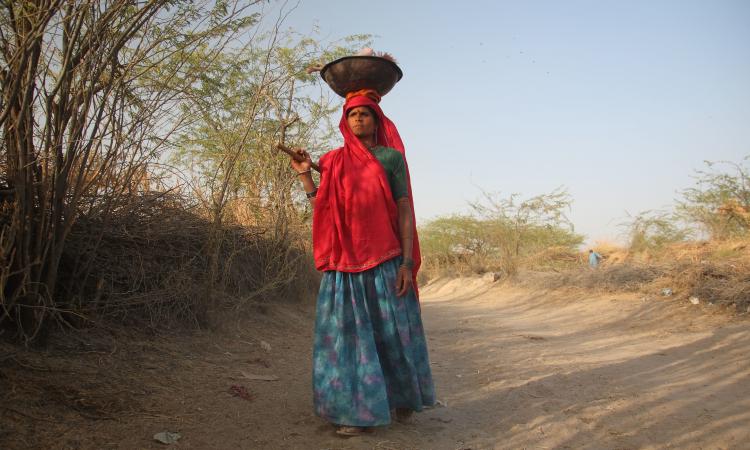
In times of crisis and calamity, women have repeatedly been cast, portrayed, and even studied as vulnerable groups, their agency overshadowed by societal perceptions. This characterization extends beyond disasters to encompass human-induced socio-economic upheavals too. While this narrative implies a lack of agency among women, the reality is quite different. Contrary to the notion that women are passive recipients of change and the one’s to be 'saved’, they emerge as active participants in the face of adversity, often steering communities towards sustainable transformation.
The journey of Gayatri Devi from the Sambhar block of Jaipur district and Vishnu Kawar from Lalsot in Dausa district, both residing in the state of Rajasthan, are the perfect case of women as the agents of transformation. Despite facing relentless and distinct challenges, both these women today, stand as beacons of hope, challenging gender norms, and uplifting entire communities through their resilience journeys.
Gayatri Devi entered the world in the unforgiving terrain of the Sambhar region in Rajasthan, where the harsh arid climate subjects the inhabitants to scorching temperatures that soar to a blistering 50°C for a significant part of the year. In this challenging environment, exacerbated by a meagre annual rainfall of just 320 mm, water scarcity becomes a critical issue. In this region, this crisis has been more severe due to the high contamination of water with different pollutants like fluoride, which led to severe illnesses like fluorosis, affecting both the health and quality of life of the community members.
Gayatri Devi, navigating these harsh conditions, found herself compelled to discontinue her education to assume the responsibility of fetching water for her family. Unfortunately, in India, societal norms often force girls to abandon their educational pursuits for various reasons, with the daunting task of water collection standing out among the prominent factors alongside gendered stereotypes and economic constraints.
In her formative years, Gayatri Devi Yadav assumed the mantle of addressing the pressing water crisis in her region, gaining insights into farm ponds and water management from local organisations. Recognising that water scarcity not only impeded access to drinking water but also hindered sustainable agriculture, Gayatri was determined to transform agriculture into a viable occupation within her community.
Despite encountering obstacles, including challenges from governmental and administrative quarters, Gayatri persevered with unwavering conviction. Undeterred, she initiated the construction of a farm pond, fortified with High-Density Polyethylene Plastic sheeting. Going beyond individual efforts, Gayatri played a pivotal role in overseeing the construction of 345 ponds under the 'Khet Talai' scheme. Collaborating with women from 15 villages in her region, she spearheaded the formation of 65 Self-Help Groups (SHGs), aimed at promoting financial literacy and fostering self-reliance among women.
Gayatri's dedicated commitment has led to a transformative shift in agricultural practices in the region, encompassing initiatives such as double cropping and nutrition gardening. These endeavors have not only contributed to financial empowerment for women but have also empowered them to manage their own bank accounts and family budgets. In recognition of her exceptional and pioneering contributions, Gayatri Devi Yadav was honored with the prestigious "Water Warrior Award" in 2023 by the President of India, Droupadi Murmu.
Simultaneously, Vishnu's narrative unfolds as a tale of profound personal transformation, its ripples resonating to empower an entire generation. Hailing from the Rajput community in Matlana village, Dausa district, Vishnu's journey began with an early marriage at the tender age of 19, marked by domestic abuse and her husband's debilitating alcoholism. Compounding her challenges were the stifling social customs and traditions inherent in Rajput culture in the region.
Amidst the daily struggles, Vishnu made the courageous decision to leave her marital home, seeking refuge at her parents' house to safeguard her life and that of her unborn child. The compassionate support of her sister-in-law facilitated her transition through this tumultuous period. To secure her livelihood, Vishnu embraced the skill of stitching, showcasing not only her proficiency but also ensuring a stable income and a renewed sense of purpose.
In 1995, Vishnu aligned herself with Ekal Mahila Manch, a pivotal moment that provided her with extensive resources and a platform to champion women's empowerment. This marked the commencement of revolutionary steps taken by the 19-year-old former child bride, triumphing over entrenched traditional and social barriers. Venturing further, she contested for the position of village head, symbolizing her growing influence and acceptance in society.
Today, Vishnu Kawar stands as a revered figure, commanding recognition and respect. The community turns to her for counsel, seeking her guidance before making crucial decisions. The transformation of a once young, dependent, and oppressed girl-bride into a village leader and the articulate voice of women's liberation epitomise a narrative of empowerment.
These stories, embodied by women like Gayatri Devi Yadav and Vishnu Kawar, stand as beacons of change, empowering entire communities and shaping generations to come. They challenge the narrative that positions women as passive recipients in development and resilience. Women are active agents of change who don't need saving; instead, their voices must be heard, for if we ignore them, we are doomed to drown.
These stories have been compiled by Ayushya Singh from IGSSS’s Whispers of Resilience: I Am Story, I Am Change
Charkha Features
/articles/women-harbingers-change-not-silent-sufferers